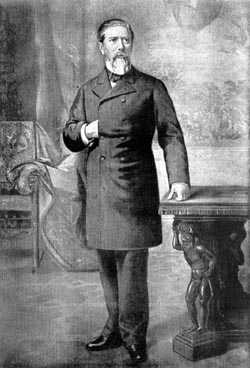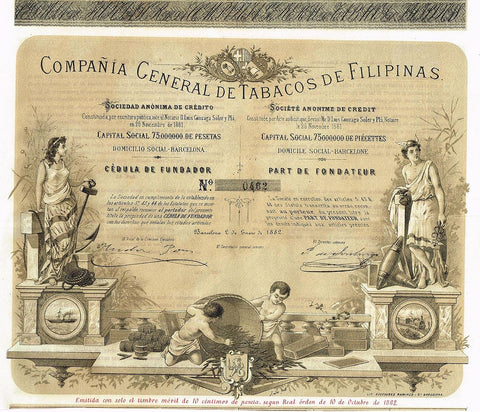OUR HISTORY
Tabacalera is the first and oldest cigar factory in Asia, and is among the oldest cigar companies in the world.
The origin of the tobacco industry in the Philippines dates to 1592, when the Spanish Galleon San Clemente brought 50 kilos of Cuban tobacco seeds to the country. The seeds were spread, along with the Catholic faith, by friars, who found that the crop flourished best in the Cagayan Valley in the province of lsabela. With a climate very similar to Cuba's Vuelta Abajo region, lsabela soon hosted a large tobacco-growing industry.
For a century, the tobacco monopoly was the colonial government's major source of revenue, and made the Philippines a financially profitable colony.
 Antonio Lopez y López
Antonio Lopez y López
By 1881, however, the tobacco monopoly in the country was unraveling under political pressure. Antonio Lopez y López, the first Marques de Comillas, formed the Compania General de Tabácos de Filipinas S.A., also known as the Compania de Filipinas (CdF), or by its nickname, "La Tabacalera,” as the privatized version of the tobacco monopoly. Tabacalera Incorporada is the direct corporate descendant of the CdF.
López, who controlled an empire based on banking and steamships, was the most influential Spanish businessman of his generation. He was close friends with the King, Alfonso XII, and Prime Minister, Antonio Cánovas.
López created the Tabacalera as a private company designed to acquire the tobacco monopoly's assets from the Spanish colonial government. The Tabacalera's Incorporators, along with López, were the Sociedad General de Credito Inmobiliario Español, Banque de Paris and the Bank of the Netherlands. The Spanish crown remained the majority shareholder, and the company was also listed on the Madrid and Barcelona stock exchanges. The Tabacalera took over the five existing government factories in the Philippines, and the associated logistics and trading network, even as the tobacco monopoly officially came to an end on December 3, 1882.
 Compania General de Tabácos de Filipinas Stock Certificate
Compania General de Tabácos de Filipinas Stock Certificate
Spanish rule in the Philippines ended with the Philippine Revolution of 1898, and American rule began with the American invasion the same year. Neither of these substantially impeded the growth of the Tabacalera.
The company established “La Flor de la Isabela” (the Flower of Isabela) in 1887, as the largest and most sophisticated tobacco and cigar factory in the world at the time. It was the first Philippine cigar factory capable of volume production for export. By the late 19th century, primarily through the export of La Flor de la Isabela, the Manila Cigar became every bit as celebrated throughout the world as the Havana Cigar.
 La Flor de la Isabela Factory
La Flor de la Isabela Factory
The Tabacalera expanded its operations well beyond tobacco; into abaca (hemp), copra (coconut oil), sugar, inter-island shipping, and liquor trading. It prospered and became the largest company in the Philippines. However, the introduction and widespread popularity of cigarettes eventually displaced cigars in the market. Finally, World War II destroyed many of the Tabacalera’s facilities. The company rebuilt after the war, but by the late 1980s, its operations were a faint echo of what it had once been a hundred years before.
After a century, CdF sold the entire Tabacalera tobacco business, including the name, to a Filipino group. This group rejuvenated the factory, adding modern equipment and storage facilities and a vacuum chamber, and rebranded the business “La Flor de la Isabela,” with new packaging for all lines. One thing didn’t change: the factory continued to make cigars the same way they made them in 1881, “totalmente hecho a mano” (totally handmade).
 Señor Alfredo Salinas, 1997
Señor Alfredo Salinas, 1997
La Flor de la Isabela brought in a Cuban master cigar maker, Señor Alfredo Salinas, as a consultant. He stayed in Manila for several years, and even brought his mother along from Havana. Sr. Salinas improved every aspect of the operation, from working with the tobacco growers, to selecting the harvest, curing, aging, and blending. He taught the workers the Cuban rolling style, which ensures a consistent and effortless draw.
 Cigar Divan
Cigar Divan
Today, the company has reverted back to its old name: Tabacalera Incorporada. Our tradition is more than a name. Each cigar we make is a work of art, and a product of impeccable quality. Our cigars undergo strict quality measures to ensure consistency in appearance, fermentation, draw, smell, and taste. Our goal remains to deliver the best smoking experience you will ever have.
